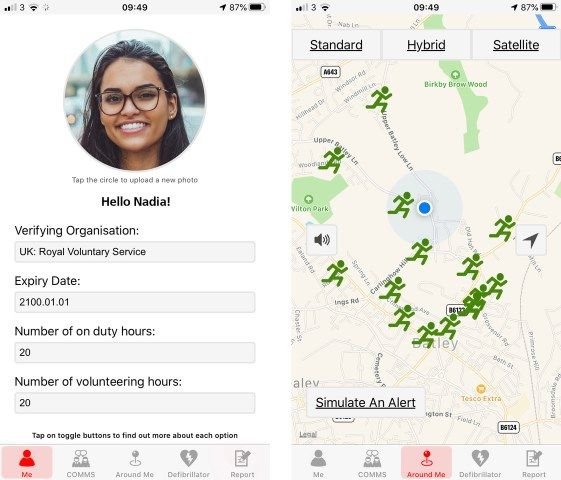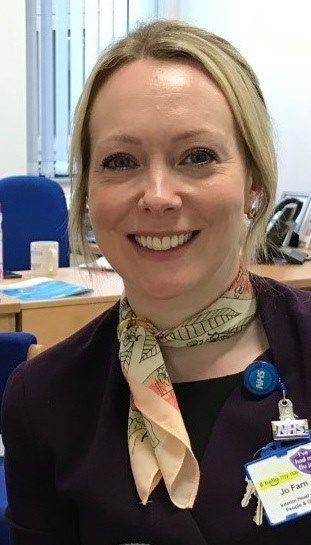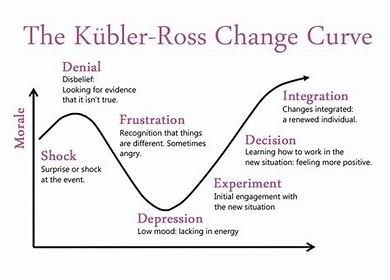Posted on: 9 April 2020
 Hello my name is Rob
Hello my name is Rob
As we approach Good Friday, I wanted to wish everyone a happy Easter at what is traditionally a time for family and holidays. It is also Holy Week, one of the most important times for our Christian colleagues.
This year will be very different as our lives are fundamentally changed. Social distancing must be adhered to, despite the predicted warm weather and the emerging evidence that we may be seeing some impact on the rate of growth. Be under no illusion, that is the impact on the rate of growth. It is not a reduction in numbers or the impact on the NHS and the care sector. Wherever possible stay home, save lives.
At this time, it’s also clear that many more of us will be working. Thanks to all of you who are delivering vital services across this weekend. You will be doing so in person and remotely via the explosion in remote working and digital technologies. The latter are often ensuring people feeling social connected like never before through social media - or other online tools such as Skype, Zoom, Facetime, Microsoft Teams, House Party and so on.
As a Partnership, we have been working through our teams to deliver radical change. The Health Service Journal (HSJ) piece here reflects some of this, and every local media is full of stories of changes that will ensure services are available for those who need them, testing is ramped up and Personal Protective Equipment is secured for everyone. This is a dynamic environment and we are working incredibly hard to keep staff and people safe.
I wanted to shine a light on how, with the support of local community organisations, council staff and / or volunteers we are working with isolated and vulnerable people. This is the other end of critical care, away from the spotlight of that provided in our hospitals, securing support for people who are shielded and vulnerable.
Shielding the most vulnerable people follows national guidance and there are three areas of support being coordinated by our council partners:
- Direct delivery of food
- Medicines and support through community pharmacy
- Social contact support and role of voluntary community organisations.
This guidance is for people, including children, who are at very high risk of severe illness from coronavirus (COVID-19) because of an underlying health condition, and for their family, friends and carers. It is intended for use in situations where the extremely vulnerable person is living in their own home, with or without additional support. Local authorities have developed community hubs in partnership with primary care networks and voluntary community organisations to coordinate this work. Across West Yorkshire alone, at least 40,000 people have been identified and are being supported.
There are also many other groups of people who need support and it’s essential as a Partnership we keep them firmly in view. Out of sight really is not out of mind. People living in rural communities, those with mental health problems and / or other health conditions; homeless people; families with children who are finding it hard to cope and victims of domestic abuse remains a priority to us all.
This is one of many reasons why we have repurposed the work of our Improving Population Health Management Programme and have asked our West Yorkshire and Harrogate priority programmes to look at how they can realign their funding arrangements with voluntary and community partners to re-focus any remaining money from the £900k allocated by the Partnership last year to enable our VCS partners to offer a range of support to vulnerable people during the coronavirus pandemic quickly. We are also looking at how we augment this quickly in each place.
In his letter to every UK household, the Prime Minister thanked everyone who is working flat out to beat coronavirus and that we will beat it together. There’s no better example of this than the fact that over three quarters of a million people have already signed up to help relieve pressure on health and care services by volunteering - more than three times the original target number.
From Tuesday, these volunteers began supporting people in their local areas who are considered to be most at risk from Covid-19.
When they are available to help, volunteers simply switch their GoodSam app to ‘on duty’ to view requests by health professionals, pharmacists and local authorities.
We know that it’s been a huge effort to get this invaluable scheme up and running in such a short space of time. This just goes to show what can be done when the stakes are so high and when people pull together for a common cause.
Key to all of this is how we capture the good practice taking place across West Yorkshire and Harrogate, the wonderful achievements delivered at pace by a flexible workforce, made up of staff, volunteers, families, carers and neighbours. For me, it is very reassuring to know that the transferable skills, flexibility and dedication of all these groups of people are yielding positive results against this backdrop.
We are aware of concerns that many people across the country are not seeking the medical attention they need, not just in relation to Covid-19 but for other serious health issues. Latest figures from Public Health England show that attendance at emergency departments in England has dropped by 34.5% on the same week last year.
This reluctance to seek help for a medical emergency may be due to the fear of contracting Covid-19, or may simply be that people don’t want to ‘burden’ the NHS at this difficult time. All were areas discussed by the Clinical Forum when they met on Tuesday. There is a growing concern that we are storing up a lot of health and operational risks in the months ahead. It’s important we understand the levels of missing activity and the impact on health and health inequalities. Make sure you look at your local websites, use NHS 111 online and access the care you need through the revised arrangements in place.
I wish you all a safe and enjoyable bank holiday weekend and for the many thousands of you working hard to keep us well and healthy – thank you.
Rob
 Hello my name is Jo
Hello my name is Jo
I’m the new Programme Director for the System and Leadership Development Programme. Our work is about enabling learning to be shared across our partnership and supporting transformation to achieve the very best outcomes for people.
We do this in various ways, including facilitating behaviour change and developing leadership. This current context has prompted me to think about how leadership, behaviour and learning ‘shows up’in a crisis.
What a time to join the partnership! I was looking forward to a three month induction - meeting people, listening to what they were working on, understanding how I could support them. Put simply getting to know them and building trust and relationships. Doing all of this over the phone or via zoom never figured in my plan, in fact I didn’t know what zoom was until last week (NB it’s a way of talking to people through your laptop via a video link).
We are all currently moving through uncertain times, on a steep learning curve, trying to get to grips with our new ‘normal’ whether that is undertaking a different focus at work, working from home, not working, home schooling, social (physical) distancing or some combination of all of them. The roles we do across our partnership are all ultimately about looking after other people. In this current climate of GOLD command and crisis management, it’s all hands to the pump to ensure safe and speedy discharge of people from hospital, ensuring our vital business as usual services function and working towards increasing our critical care capacity. With this all in view it’s very easy to fall into a trap of forgetting to care for ourselves and each other during this challenging time. But this context makes it all the more important to be kind to ourselves, as well as each other; it’s the old adage about putting your own oxygen mask on first before helping other people.
 For me this is really important for our own wellbeing because our behaviour is a direct result of what’s going on internally for us, and how our behaviour ‘shows up’ in how other people experience us; the impact of which can be positive or negative.In a bid to keep this simple, I wanted three key things to help look after ‘you’ and each other….I’ve ended up with five….
For me this is really important for our own wellbeing because our behaviour is a direct result of what’s going on internally for us, and how our behaviour ‘shows up’ in how other people experience us; the impact of which can be positive or negative.In a bid to keep this simple, I wanted three key things to help look after ‘you’ and each other….I’ve ended up with five….
1. Laugh out loud! This is serious business….laughter generates neurotransmitters (happy hormones) which reduce stress. Prolonged periods of stress are not good for our cognitive ability, decision making and immune system. Seek out what or who makes you laugh and design it into your day. Don’t be afraid to laugh or smile; it really is infectious and something we should focus on spreading!
2. Recognise and value other people. This is another neurotransmitter releaser….include colleagues, pull them in, ‘see’ them and their work, ask how you can help them and how they can help you; no one of us is better than all of us. Role model an ‘us and us’ mentality rather than ‘us and them’. At times of information overload and high pressure our cognitive processing ability narrows, this may cause us to look down, rather than out at what other people are doing, with less consideration about how we might be able to help. I love the 15 seconds, 30 minutes campaign which came from Bradford Teaching Hospitals Trust; it works on the basis that I might be able to do an action now that would take me 15 seconds extra but that would save a colleague 30 minutes later.
3. Be aware of your leadership style; what’s it like to be on the receiving end of you? No matter what role we do, we are all leaders; we all have the potential to influence a situation or another person. Never has this potential been more vital than it is now. However, we need the impact of our behaviours to have positive effect, in times of pressure our behaviours don’t always show up that way. Our context will require a more directive style for some tasks; telling colleagues what we need them to do and how. However, it will not be needed for everything, so be aware of relying on it too much as it may have unintended consequences on other’s wellbeing. Ensure it’s balanced with a good amount of supportive and coaching behaviour by asking questions and listening to understand.
4. Be kind. During times of stress micro-aggressive behaviours such as rudeness, not listening, and interrupting might show up. These incivilities impact on the recipients by reducing their decision making ability and making them less likely to help others as well as adversely impacting their wellbeing. The work done on civility saves lives is well worth a read for more on this and the recent King’s Fund blog on compassionate leadership.
5. Forgiveness. Like me, you may be reflecting that you’ve displayed some of these behaviours in the last week; so my final tip is to be kind to yourself; forgiveness is important, acknowledge the behaviour, apologise, forgive yourself and move on. This is key to resilience; the ability to ‘bounce back’.
As the weeks progress, we will all go through a learning and development journey about ourselves and our response to Covid-19. NHS England has developed new ways to improve your experience of work with short 10- to 20-minute guides developed by experts for everyone in the health and care workforce. The aim is to help you manage your own health and wellbeing whilst looking after other. You can access them here.
My final (final) ask is to reflect on this learning and capture it. We’ve been part of transformation in the last two weeks that would have taken months if not years to achieve....take a moment to reflect on how you’ve moved on as a person, how your team have embraced change, how your service or organisation has achieved the seemingly impossible in the last two weeks and beyond. Consider the positive things that have emerged, what things could we leave in the past, what learning and improvement we could take into our future?
What is becoming clearer in these unprecedented times is the opportunity for role modelling the behaviours we want to see and the chance to learn is also unprecedented and could set us up for impact that propels our Partnership way beyond the transformation that we aspire to achieve.
Jo
Coronavirus (COVID-19) updates
Thank you to everyone for working exceptionally hard around the clock to keep people safe and well during these uncertain times. All information is hosted on the following websites:
- Info for public (health advice)
- Info for healthcare professionals
- GOV.UK - The GOV.UK page has also been set up to bring together guidance for local councils and Local Resilience Forums (LRFs) during the coronavirus outbreak. You can access it here.
- GOV.UK has also produced this guidance for people who provide unpaid care to friends or family during COVID-19.
We need your help
 We want to thank all key workers for working over this bank holiday weekend to keep us safe and keep essential services running. We have decided to call this a #ThankHoliday and we’re asking you to join us. Our aim is to get #ThankHoliday trending and we’d love it if you would join our #ThankHoliday message that we are sending out on Friday at 9am. As you know key workers, such as nurses, social workers, doctors, bin crews, supermarket staff, delivery drivers and many more are working hard to deliver services to the public. We want to thank them and make sure this message circulates all over social media. You can do this via your facebook or twitter account with the note to say ‘A huge #ThankHoliday to all key workers for keeping the world running this bank holiday!’
We want to thank all key workers for working over this bank holiday weekend to keep us safe and keep essential services running. We have decided to call this a #ThankHoliday and we’re asking you to join us. Our aim is to get #ThankHoliday trending and we’d love it if you would join our #ThankHoliday message that we are sending out on Friday at 9am. As you know key workers, such as nurses, social workers, doctors, bin crews, supermarket staff, delivery drivers and many more are working hard to deliver services to the public. We want to thank them and make sure this message circulates all over social media. You can do this via your facebook or twitter account with the note to say ‘A huge #ThankHoliday to all key workers for keeping the world running this bank holiday!’
Local authorities
Coronavirus has presented local authorities with a duty to pass on essential information and help save lives. Residents and business are increasingly looking to councils for advice and support, alongside information available from other sources, including local voluntary and community organisations. Councils are explaining the assistance available to residents and employers; including schools, housing, waste collection and bereavement. This also includes telling residents which facilities are open or closed and where things have changed, such as parking charges or restrictions. You can find out more about the work of local government here.
The role of Local Resilience Forums (LRFs)
LRFs were set up under the Civil Contingencies Act 2004. They are multi-agency partnerships made up of representatives from local public services, including the emergency services, local authorities, the NHS, the Environment Agency and others. The geographical area the forums cover is based on police areas. LRFs also work with other partners in the military and voluntary sectors who provide a valuable contribution to LRF work in emergency preparedness. The LRFs aim to plan and prepare for localised incidents and catastrophic emergencies. They work to identify potential risks and produce emergency plans to either prevent or mitigate the impact of any incident on their local communities. You can find out more here. The West Yorkshire LRF, declared the coronavirus (COVID-19) pandemic as a ‘Major Incident’ on 20 March. Every LRF across the country has now moved to this status. Robin Tuddenham, CEO for Calderdale Council is the local authority lead for our LRF and Anthony Kealy is the NHS Lead for NHS England / NHS Improvement.
COVID-19: Pharmacies
As the UK responds to the COVID-19 pandemic, community pharmacies in West Yorkshire are working tirelessly to ensure that everyone’s medicines and healthcare needs will be met over the coming days and weeks. Pharmacy teams are a critical part of the NHS and in the past weeks they have seen demand for over-the-counter (OTC) medicines, other products, advice and reassurance soar. To help pharmacies to cope under the increasing pressure, Community Pharmacy West Yorkshire is asking people to:
- Avoid pharmacies if you are showing symptoms of COVID-19: If you have a dry, persistent cough, fever or shortness of breath, please avoid entering your local pharmacies as you would any other healthcare setting.
- Be patient: All pharmacies are under immense pressure and working around the clock to ensure that you get what you need.
- Order medicines as normal: There is no need to stockpile medicines. Ordering extra prescriptions and buying more over the counter medicines than you need will contribute to disruption to the medicines supply chain, which is otherwise robust.
Most pharmacies can be contacted by phone and email, and many have their own websites and social media channels. For further details please contact Ruth Buchan, Chief Executive, Community Pharmacy West Yorkshire via ruth
Recent publications
- Guidance on how to protect care home residents and staff during the coronavirus outbreak was published on 2 April.
- Coronavirus (COVID-19): notification to organisations to share information.
- All the LGIU coronavirus guidance, briefings and comment in one place.
- Door Drop Leaflet: This is a vital campaign update from the government about Coronavirus.
The leaflet contains information on what everyone must do to help stop the spread of Coronavirus. There is also information on spotting the symptoms, advice for vulnerable groups, and information about Government support for businesses and workers.
NHS Volunteer Responders
NHS Volunteer Responders have been mobilised to help support vulnerable people who are self-isolating. Priority will be given to those identified as most at risk from COVID-19 and asked to self-isolate at home for an extended period, and to those who health practitioners and local authorities consider to be vulnerable. The volunteer initiative is being delivered by NHS England and NHS Improvement in partnership with Royal Voluntary Service and enabled by the GoodSam Responders app. Referrals for volunteer support can be made by the following health and care professionals:
- GPs / social prescribing link workers / practice nurses concerned about an at risk or vulnerable individual they have advised to self-isolate
- Hospital discharge teams
- Community pharmacists
- NHS 111 and ambulance trusts
- Community health trusts that need volunteer support for patients leaving hospital • Local authorities.
The guidance for referrers can be found here.
Regulations
New regulations allowing local authorities to hold public meetings remotely by video or telephone were published ready to come into force on 4 April. The regulations are time limited and apply in relation to meetings taking place before 7 May 2021. The government is also working to bring in new law so that by-elections, local polls and referendums cannot be held before 6 May 2021. The Coronavirus Act 2020 has already postponed local and Police and Crime Commissioner Elections scheduled in the UK for Thursday 7 May 2020 until 6 May 2021. Regulations
What else has been happening this week?
Health and Care Champions
The Health and Care Champions team made up of people with learning disabilities is setting new project priorities for the next three months. They have formed a WhatsApp group, Zoom and Facebook group for those have already signed up to be Health and Care Champions. This will help to support the different levels of training for their roles and to ascertain what their worries are around the current COVID19 crisis. This will include what help they may need and promoting safe behaviours in relation to CoVid-19 and maintaining good health when isolated at home. This may also include preventing ill health, smoking cessation, diet and exercise.
Assessment treatment units for people with learning disabilities
Following recent guidance from NHS England/Improvement and discussions with NHS England colleagues it has been agreed that the engagement work for assessment treatment units will be paused during the current COVID-19 pandemic. We will keep you updated when we know more.
Harnessing the Power of Communities Programme
Nearly £2m of funding was allocated to VCS partners via the Harnessing the Power of Communities Programme over two years in 2018 and 2019. Whilst most of this has now been used to deliver much needed capacity building across the VCS and to fund the delivery of services and support to vulnerable people across WY&H, in some places we have been able to re-focus remaining money to enable our VCS partners to offer a range of support to vulnerable people during the coronavirus pandemic. Our VCS partners are key players in the delivery of many of your programme outcomes and are critical to delivering the ambitions of our Five Year Plan. Wherever possible, we are asking our WY&H programme to realign the funding criteria to develop a flexible approach that enables our VCS partners to deliver quick and effective solutions during the pandemic.
You can see a great example of the work taking place in communities in this Yorkshire Post article where a closed Leeds' theatre lends its effort to feeding city's isolated and elderly
Digital programme update: devices and laptops
NHS England are working to provide laptops to GPs and secondary care staff in West Yorkshire and Harrogate. 317 laptops have already been made available for GPs and primary care clinicians, to increase remote working capacity where gaps had been highlighted. A further consignment of laptops for secondary care are due to be delivered to the distribution centre at Sheffield Arena this week, for onward circulation.
Stroke Survivors Day 2020
Members of the West Yorkshire and Harrogate Stroke Network supported the first ever International Stroke Survivors Day on 7 April. The day celebrated stroke survivors and was a reminder that people can lead long, healthy, happy lives after a stroke. In the run up to the day, Doctors Prabal Datta and Andy Withers recorded these videos talking about how the Stroke Network is improving stroke care in West Yorkshire and Harrogate. Follow what happened on Stroke Survivors day on Twitter.

